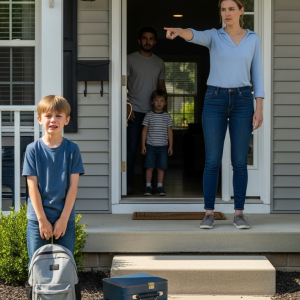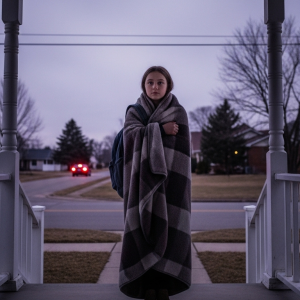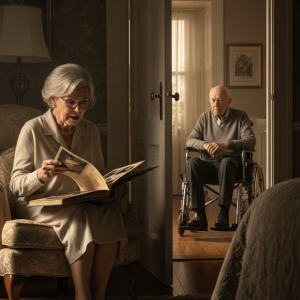The casserole had barely begun to cool when I stepped back from the stove. I’d been up since dawn, scrubbing, arranging—overdoing it, probably, but I wanted it to be perfect. My first real dinner party as a homeowner. My first time hosting the people who’d never quite believed I could stand on my own.
The table was set with Grandma’s old china. I had name cards. I still believed, or at least hoped, that they’d walk in, see what I’d built, and smile. A real smile. That Dad would finally look at me without calculation in his eyes.
At 6:35, I heard tires on gravel and my stomach coiled. They knocked. I opened the door with the kind of grin you practice because you want so badly for this one night to go right.
“Smells like food,” my sister, Isolda, said, stepping in without a hello. Her expensive suede boots tracked faint dust on the floor I’d mopped twice.
Dad followed, his eyes skimming the room—not like a proud father, but like he was appraising a rental property. “This place has good bones,” he said. “Feels like it should belong to everyone, doesn’t it?”
I laughed, a nervous, uncertain sound. Mom walked in last, her fingers grazing the mantle where I’d placed a framed picture of us from when I was ten, before things started feeling conditional.
The dinner was a landscape of passive aggression. Isolda scrolled through her phone. Dad asked how I’d managed to afford hardwood floors. Mom glanced at the clock. No one asked about my promotion.
After a dessert no one seemed to want, Dad stood. He folded his napkin with unnerving precision, his eyes locking onto mine. “We’ve discussed it,” he said, his voice flat. “This house should come back to the family.”
I blinked. “I’m sorry, what?”
My mother nodded, not looking at me. “You’ve done well, honey, but it’s too much house. We think it’s time you refocus.”
Isolda leaned back, arms crossed. “It’s not personal.”
“Your old room is still there,” Dad continued, as if offering a kindness. “But we’ll be moving into this place. Your mother has already drawn up renovation plans.”
I stood so quickly my chair scraped the floor. “You’re—what?”
“I don’t want this to get emotional,” Mom said, as if my shock was an inconvenience. “It’s a house, Jolene.”
Isolda reappeared with my suitcase, the green one I’d used for college. “We packed your essentials,” she said, her voice bored. “Just so this can be smooth.”
My voice had locked itself somewhere behind my ribs. “I’m the legal owner,” I finally whispered.
Dad’s smile was thin. “We’ll sort that.”
I didn’t cry. That would have given them too much. Instead, I walked to the table, picked up my phone and wallet, and gently laid my house key next to my untouched wine glass. A quiet, final surrender. No one said a word.
Outside, the air bit colder than it should have. The suitcase thumped in the back with every turn, a heartbeat reminding me of what had just been ripped out.
I finally stopped at a gas station on the edge of town. My phone buzzed. An unknown number.
“Ms. Shipman?” a chipper voice asked. “This is Alexis from Midwestern Bank. I’m calling to confirm some recent changes requested on your mortgage account.”
My stomach tightened. “What changes?”
“A request to add co-owners and update the primary contact details. We flagged it because the information seemed inconsistent.”
“I didn’t authorize any changes,” I said, my voice steady.
“That’s what we thought,” she replied. “You are still listed as the sole legal owner. We’ve locked the account for now. Do you have the names they used?”
“Vernon and Mara Shipman,” I said, unsurprised by the sound of my own parents’ names.
I drove back as the sun rose, washing my neighborhood in a soft, mocking gold. My key didn’t fit the lock. The curtains had changed. The door opened, and a young woman I’d never seen before stood there.
“You Jolene?” she asked, unimpressed. “This is my house.”
“I was told you wouldn’t be coming back,” she said, tilting her head. “Mara and Vernon said you had some… instability. That you left voluntarily.”
Behind her, I saw my hallway, dressed in someone else’s clothes. My rug was gone. The picture frames on the wall held strangers.
I walked back to my car, each step an effort not to tremble. I drove across town and parked outside my best friend Norah’s building. I didn’t go in. I just sat, wrapped in a crushing silence, until she found me there after dark. She didn’t scold. She just opened the passenger door and sat with me until I was ready to speak.
“They didn’t just push you out,” Norah said later, over coffee in her apartment. “They planned it.”
That’s when the memory returned, clear and cold. I was twenty-two, home from college. I’d passed by the den, the door slightly ajar. I heard my name.
“She’ll sign,” my dad had said. “Once she does, it’s ours to manage.”
Isolda’s laugh followed. “She’s clueless.”
I’d told myself it was about something else—taxes, a minor legal matter. I didn’t want to believe they saw me as a tool, not a daughter. But now, in the dim light of Norah’s guest room, I realized that moment wasn’t the beginning. It was just the first time I’d accidentally seen the scaffolding.
The next morning, we met with Barbara Herrera, a lawyer Norah knew. Her handshake was firm, her voice clipped. She listened without judgment as I laid out the story.
“You’re not the first,” she said simply. “People think real estate theft only happens between strangers. It doesn’t. The worst of it happens between people with matching last names.”
For the first time in days, I felt like I was doing more than just surviving. I felt like I was preparing for battle.
That night, Norah sat beside me as I logged into my home security system’s cloud storage. For years, motion-triggered clips had been automatically backed up—slices of movement I thought would capture porch thieves or raccoons.
Instead, they had captured my family.
There was my mother, Mara, calmly opening the drawers in my home office. Not snooping, but evaluating, like a realtor measuring storage space. There was Isolda, placing her own books on my living room shelves. And there was my father, Vernon, unplugging my router and replacing it with his own, his name scrawled on a piece of masking tape.
They weren’t trespassers. They were settlers.
Then I found a saved voicemail on my home phone account, dated two weeks before the dinner. It was Isolda’s voice, sharp and clean. “Once she’s out, don’t let her back in. Not even for the photo albums.” She wasn’t angry. She was bored, efficient. As if she were talking about clearing out a box of junk.
“They didn’t just leave,” I said out loud to Norah. “They were already moving in. My absence just made it official.”
I picked up my phone and hit record. I looked directly at the lens. “My name is Jolene Shipman. This is a record of what was taken from me. This is not for sympathy. This is for documentation.” I saved the file. The paperwork would speak, but so would I.
The cease-and-desist letter was eight pages of glorious, iron-clad legal terminology. I sealed the envelope myself. The next morning, Vernon’s voicemail came. “You just started something you won’t be able to finish.” A quiet threat disguised as fatherly concern.
I forwarded it to my lawyer. This is how they escalate, she replied. Now we pressure harder.
The calls from extended family started soon after. My Aunt Vera, her voice tense. “Jolene, you’re airing family business to lawyers. It’s not how we solve things.”
“I tried solving things at a dinner table, Vera. You remember how that ended.”
“I’m not defending them, but you’re making yourself look ungrateful.”
My breath caught. “Gratitude doesn’t include silence when someone steals from you,” I said, my voice cold and clear. “I’m not your project. I’m not their puppet. I’m the only person in this family who’s built anything without stealing it first.” Then I hung up.
An email arrived with no message, just an audio file. Norah and I listened, frozen, as my father’s calm voice filtered through the speaker. It was a recording of him and Isolda, a strategy session.
“We start with the key,” Vernon said. “Once she’s out, change the locks… She’ll push back, but it won’t hold in court if it looks like a family matter.”
Isolda laughed. “She’ll cry first, then call a lawyer. By then, the narrative’s ours.”
It wasn’t a family dispute. It was a hostile takeover. We sent the recording to Barbara. A court hearing was scheduled.
The ripple effect was swift. A business partner called my father, asking if the rumors about his daughter and real estate fraud were true. Isolda was quietly removed from the speaker list of a women’s leadership conference. Their carefully constructed narrative was beginning to fray, not because of what I’d said, but because of what they had done.
In the courtroom, my father spoke of “protecting family assets.” Isolda claimed she was just “helping organize the property.”
Then it was my turn. I didn’t raise my voice. I didn’t cry. “I bought that house alone. I paid every mortgage installment myself. They entered my home without permission and packed my belongings while I was at work. When I questioned it, they called me unstable.” I paused, letting the silence do its work. “They didn’t just try to take a house. They tried to erase the woman who built it.”
The judge’s ruling was swift. The house was mine. The restraining order was upheld. An inquiry into financial misconduct was opened.
Reclaiming the house was harder than I expected. It didn’t smell like home. Their presence lingered like a stain. One drawer at a time, I started undoing them. In the kitchen, I found a note in my mother’s handwriting. You’ll understand someday. Family decisions are complex. We meant well. No apology. No remorse. I lit the corner of the page with a match and watched the ash float away.
The day before Thanksgiving, I found a manila envelope on my porch. No return address. Inside was a photo of my childhood bedroom. A thick, red X was marked across the bed. The threat was symbolic, but clear.
Isolda showed up a week later. “I’m not proud of how things happened,” she said.
“You’re not here for me,” I replied, my voice quiet. “You’re here to control the story.”
She flinched. “Maybe I was jealous. Maybe I didn’t think you deserved the house.”
“There it is,” I said softly. “You don’t get to rewrite your role just because I survived it.”
A Christmas card came from my mother. Wishing you clarity and peace, from Mom. Tucked inside was a quote about forgiveness. Forgiveness doesn’t always require reconnection. I didn’t respond.
On New Year’s Eve, I sat on my porch, bundled in a blanket Norah had knitted for me. Vernon had sent one last letter. I shouldn’t have let things get that far. I didn’t realize how much of it was yours. Not an apology, but a concession.
Fireworks cracked softly over the neighborhood. “They tried to take my house,” I whispered to the quiet night, “but they couldn’t take the woman who built it.”
I walked inside and locked my door. Not in fear. In peace. My home didn’t need to be explained. It just needed to be mine. And now, it was.
The silence in the house had changed. For months after I reclaimed it, the quiet felt fragile, like a held breath waiting for the other shoe to drop. I’d find myself tensing at the sound of tires on the gravel driveway or the rustle of mail through the slot. But as winter thawed into a soft, damp spring, a new kind of quiet settled in. It was no longer the tense, listening silence of anticipating the next attack, but the deep, comfortable quiet of a place at peace with itself.
I had systematically cleansed the house of their presence. I repainted the living room a warm sage green, erasing the sterile beige my mother preferred. I ripped out the stiff, formal landscaping they had started and, with Norah’s cheerful, if clumsy, help, planted a chaotic wildflower garden in its place. Every change, no matter how small, was an act of reclamation. This wasn’t just a property; it was my territory, and I was redrawing the map.
The legal battle had concluded with a whimper, not a bang. My lawyer, Barbara, called me one Tuesday morning in April.
“Vernon pleaded no contest to the financial fraud charges,” she said, her voice crisp and professional. “He avoided jail time, but the fines are substantial, and he’ll have a felony on his permanent record.” She paused. “More importantly, Jolene, the story is now officially written in ink that he can’t erase. The restraining order is permanent. They have no legal grounds to contact you ever again.”
I thanked her, my voice steady. There was no surge of triumph, no desire for revenge. There was only the quiet satisfaction of a final, closed door. They had started something they couldn’t finish, and now the world knew the truth.
But peace, I was learning, was an active state of being, not a passive one. With the external battle won, the internal one began. The house, once a symbol of my independence, now felt… vast. My mother’s words, meant as a criticism, echoed in my memory: It’s too much house for one person. I had rejected the premise then, the entitled assumption behind it. But now, sitting alone in the quiet dining room, I heard the words differently.
What if, I thought, she was right? Not as a flaw, but as an opportunity. What if this house wasn’t just meant to be a fortress for one, but a sanctuary for more?
The idea took root slowly. It was sparked by a post in the online support forum, a message from a young woman named Maya, just twenty-one, who was about to age out of the foster care system. She wasn’t asking for money; she was asking for advice. How do you rent an apartment with no credit history? How do you find a job with no family references? How do you stop feeling like you’re standing on a cliff’s edge with no safety net?
Her words resonated with a painful familiarity. I had been lucky. I had a career, I had Norah. Maya had no one.
I spent a week thinking about it, researching, and talking it over with Norah. “Are you sure about this?” Norah had asked, her expression serious. “Bringing a stranger into your home after what you’ve been through?”
“They weren’t strangers, Norah,” I replied softly. “That was the problem. This feels different. This feels like… building something instead of just defending something.”
I contacted Maya through the forum’s moderator. We met for coffee, then lunch. She was quiet, cautious, with intelligent eyes that had clearly seen too much. She spoke of her dreams to become a veterinary technician, the hurdles that seemed insurmountable, and the terrifying prospect of homelessness looming in just two months when she turned twenty-two. She never asked for anything.
It was I who made the offer. “I have a spare room,” I said, trying to sound casual. “Two, actually. It’s too much house for one person.” I used my mother’s words, but this time, they were an invitation, not a condemnation. “It’s not charity. You’d help with utilities, keep up with your studies. Think of it as a soft launch into the real world. A place to stand while you build your own foundation.”
Maya stared at me, her eyes wide with a disbelief that broke my heart. “Why would you do that?” she whispered.
“Because someone once tried to take my home by telling me I didn’t belong in it,” I said. “I’ve decided the best way to prove them wrong is to share it with someone who needs to be told they belong somewhere.”
Maya moved in on the first of June. She arrived with two duffel bags and a worn-out backpack, her entire life contained in three small bundles. As I showed her to the guest room—her room—I saw her run a hand over the solid wood of the dresser, her eyes taking in the clean sheets and the small vase of wildflowers I’d placed on the nightstand.
I handed her the key. It was a simple, newly cut piece of brass, but as Maya’s fingers closed around it, the weight of the moment felt immense. A key, I realized, wasn’t just a tool to lock a door. It was an invitation to be safe. It was a statement of trust. It was everything my family had tried to take from me.
“Thank you,” she said, her voice thick with emotion. “No one’s ever… given me a key before.”
That evening, the house was different again. The silence was no longer empty; it was filled with the quiet sounds of another life. The soft hum of a laptop from Maya’s room, the gentle clink of a mug being placed in the sink. It wasn’t the noise of my biological family, the tense, loaded sounds of obligation and resentment. This was the sound of a new beginning.
I sat on the porch as dusk settled, a cool breeze rustling the leaves of the old oak tree. I thought about the suitcase my sister had packed for me, the cold finality of that gesture. It was meant to be an ending. But they had underestimated me. They had seen a daughter to be controlled, an asset to be claimed. They had never seen the woman who could build a life from scratch, who could find strength in the quiet spaces they had abandoned.
My parents had tried to claim the house belonged to the family. And sitting there, listening to the gentle sounds of my new housemate settling in, I realized that in a way, they were right. It just wasn’t their family. It was the one I was building now, one chosen person, one act of defiant kindness at a time. The house wasn’t just a structure of wood and nails anymore. It was becoming a foundation. And this time, it was a foundation I would choose who to share it with. The story wasn’t over; I was simply turning to a new, unwritten page.




